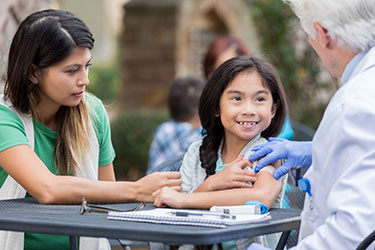More kids in the U.S. are being vaccinated against human papillomavirus, a sexually transmitted disease that causes a variety of cancers in both women and men. But even as vaccinations increase, hesitancy is also on the rise.
In a study published in March in Pediatrics, researchers found that while more pediatricians regularly recommend the HPV vaccine, hesitancy among parents has increased significantly. Between 2012 and 2018, the proportion of unvaccinated adolescents who received a HPV vaccine recommendation from their provider rose from 27% to nearly 50%. During that same period, HPV vaccine hesitancy among parents rose from just over 50% to 64%. 
Hesitancy among parents of girls went up from 54% to 68%, while hesitancy among parents of boys increased from 44% to nearly 60%. The study findings are based on data from the Centers for Disease Control and Prevention’s National Immunization Survey.
“We weren’t surprised that (provider) recommendations have gone up because (we) know providers are getting more educated about the HPV vaccine,” said study co-author Kalyani Sonawane, PhD, an assistant professor at the University of Texas School of Public Health in Houston. “But we were surprised to see a parallel increase in hesitancy — we thought that would have remained about the same.”
CDC recommends boys and girls ages 11-12 receive two doses of HPV vaccine, which was first approved by the Food and Drug Administration in 2006. The vaccine prevents HPV infection, which is responsible for nearly all cases of cervical cancer and is also associated with cancers of the vagina, penis, anus and throat. The sexually transmitted virus causes nearly 36,000 cases of cancer in men and women each year in the U.S., according to CDC.
While recent research found that by 2017, more than half of 15-year-olds had received at least one HPV vaccine dose — a significant increase over previous years — that number is still far below national goals and leaves millions unvaccinated. Several factors contribute to HPV vaccine hesitancy, including the spread of vaccine misinformation and lack of awareness that the vaccine not only prevents HPV but many cancers as well, Sonawane told The Nation’s Health.
Last year, Sonawane coauthored a different study published in The Lancet Public Health that estimated parents’ intent to vaccinate their children against HPV. She and her colleagues found that safety concerns were the most common reason for not initiating the vaccines series among hesitant parents.
“We highly suspect it’s misinformation that’s driving this negative trend in vaccine confidence, and we really need to start tackling that problem as a country,” Sonawane said. “But right now, one of the most effective things we can do is to give providers better tools and resources so they can tackle misinformation.”
One of the major sources of misinformation on vaccines is social media. Facebook in particular has been a major purveyor of misinformation about HPV vaccinations, a January study in Vaccine found.
Monique Luisi, PhD, an assistant professor at the University of Missouri School of Journalism, analyzed more than 6,500 public HPV vaccine-related Facebook posts published within the first 10 years of the vaccine’s approval. She found that nearly 40% of Facebook posts about HPV vaccination amplified a perceived risk about the vaccine. These posts received the most reader interaction and appeared more frequently in recent years.
“The internet can be a wonderful tool,” Luisi told The Nation’s Health. “But access to information does not necessarily equal knowledge. So if people don’t know how to interpret and discern what they’re reading, we can have problems.”
People who are vaccine hesitant become so for varying reasons, Luisi said. Efforts to address hesitancy should avoid a one-size-fits-all approach.
“You have to meet people where they are,” she said. “It’s not enough to say vaccines are safe and effective because you might not be addressing the root cause of someone’s hesitancy.”
Earlier this year, the U.S. Department of Health and Human Services launched a campaign to improve HPV vaccination rates among young adults. The HPV Vax Now campaign targets adults ages 18 to 26 and specifically aims to reach residents and health care providers in Mississippi, South Carolina and Texas, which have some of the lowest HPV vaccination rates in the nation.
For more information on HPV vaccination, including resources for parents, visit the CDC website.
Photo by Steve Debenport, courtesy iStockphoto.